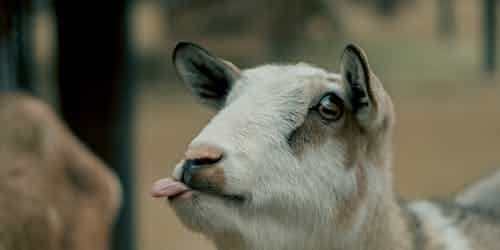Goat farming is a popular agricultural activity in Nigeria and throughout Africa. Goat meat, milk, and skin are highly appreciated, making goat farming a viable business enterprise. Nigeria, with an estimated population of over 34 million goats, is one of Africa’s largest goat-producing countries, according to data. In the Nigerian livestock market, goats are the most traded livestock.
We will cover all you need to know about goat farming in Nigeria before you purchase one for yourself in this tutorial.
What is a Goat?
Goats are domesticated mammals recognized for their adaptability to a variety of climates and terrain. Capra aegagrus hircus is the scientific name for these animals, which are kept for meat, milk, fiber, and as pack animals. Because goats have a unique digestive tract that allows them to consume a wide variety of plants, they are perfect for use in land management activities. Because they are hardy and require little care, they are a popular livestock alternative for small-scale farmers in Nigeria and Africa.
What is Goat Farming in Nigeria?
The process of maintaining and producing goats for meat, milk, fiber, and other goods is known as goat farming, sometimes known as caprine farming. Goat rearing is a profitable enterprise that has been conducted for ages in Nigeria and Africa. Goats are noted for their adaptability to severe surroundings and may be raised in both rural and urban settings.
Goat farming is regarded as a significant element of agriculture in Nigeria and Africa, and it plays an important role in the socioeconomic development of rural areas. Goat farming is a profitable business enterprise with significant revenue and job creation possibilities, particularly in rural areas where poverty and unemployment are prominent.
Benefits of Goat Farming In Nigeria
People should keep in mind that commercial goat farming businesses have varied goals, such as meat production, milk production, or breeding. The goat farming industry has demonstrated both economic and social benefits. Some of the advantages are as follows:
- Nigeria’s weather and climate characteristics are ideal for goat raising.
- Goats generate high-quality meat and milk for human consumption. In Nigeria, goat products are in high demand.
- Because goat farming requires little effort, people of many professions can start a goat business alongside their existing career.
- In comparison to other enterprises, beginning a goat farming business in Nigeria requires a lower initial investment.
- Housing, feeding, caring, and other administrative expenditures are lower in goat farming.
- Commercially, the goat farming sector in Nigeria has a high return on investment (ROI). That means you’ll earn a solid return on your overall capital or investment in a year or two. Profitable goat rearing in Nigeria begins in the second year.
- Nigerians benefit economically from the goat rearing sector.
- The adaptability of goats to nearly any climate condition is one of the key advantages of the goat farming business.
Types of Goat Breeds
You can start this company with the following goats:
#1. Dairy breeds
Alpine, Nubian, Nigerian dwarf, LaManchas, Oberhasli, and Saanen goats are among the goat breeds. These goat breeds have a long lactation phase and can produce between 5 and 8 liters of milk each day. Milk Goat milk is a high-nutritional-value food that is good for both adults and children. Goat milk can be used to make dairy products such as goat cheese. The amount of milk produced depends on the type of goat, with the best producing up to 4 liters of milk each day.
#2. Meat breeds
Spanish, Boer, Kiko, Beetal, and Tennessee are among them. These animals have a huge body mass and can swiftly gain weight. Goat meat is high in nutrients and fatty acids, and it varies from other meats in that it has less cholesterol.
#3. Wool breeds
Angora, Pygora, and Cashmere are the most important wool breeds. Because goat wool is of great quality, it is highly prized in businesses. Goat wool is mostly utilized in the manufacture of textiles, carpets, and knitwear. Some goats, such as cashmere, produce a prized sort of wool. Goat fly-wool products are lighter and softer than sheep wool.
Starting Goat Farming in Nigeria
If you wish to be self-employed or supplement your regular income, a commercial goat farming business may be ideal for you.
First, obtain the appropriate instruction from your local livestock farming training center or any experienced goat farmer, and then follow the step-by-step guide I’ve supplied below.
#1. Select A Suitable Farm Location
It is critical to select suitable land for your farm. Consider the availability of some utilities, which I have listed below, when choosing land for commencing goat farming in Nigeria.
- Choose a plot of land that is not too far from the town.
- Determine whether or not another farm exists near your chosen location.
- The location must be suitable for establishing a pasture or grazing area.
- A market close to the farm field, where you can conveniently purchase necessary equipment.
- All forms of veterinarian services are available.
- Excellent supply of fresh, clean water.
- Excellent transit to the next market or town.
#2. Do You Want to Produce Meat or Milk?
Goats are a versatile animal. Goats may provide meat, milk, skin, fiber, manure, and other products all at the same time. Determine which products are in high demand in your area.
If goat milk is in high demand in your area, you can start a dairy goat farming business. If there is a large demand for goat meat, you can easily develop a meat goat farm.
So, before you begin goat farming in Nigeria, evaluate your local market and begin creating things that are in high demand.
#3. Purchase High-Quality Breeds
Purchasing high-quality, healthy goat breeds for your farming operation is a critical component. Purchase high quality, fresh, and healthy goats after selecting which goods you will create.
According to the weather in Nigeria, Nigerian dwarfs, Maradi, Pygmy, Boer, Saanen, Nubians, and others are ideal for farming.
#4. Housing
For commercial goat production, keep your goats in clean enclosures free of humidity, drafts, and pests such as flies and rats.
Because goats are small animals, they require proper fence. Do not keep your goats in sealed enclosures.
To achieve the required growth and health, the house must have an appropriate ventilation system and a sufficient flow of air and day light.
Small-scale farmers typically keep their goats with other livestock animals such as cattle or sheep. However, for commercial production, you must build a dedicated housing for them.
Keep the house or shelter clean at all times, and use fresh hay or straw for bedding. You can also put some toys inside the house to keep your goats entertained and busy. Some producers discovered that this has a positive effect on goat health.
#5. Feeding
You can get the most out of your business by feeding your goats high-quality, fresh, and nutritional food on a regular basis. Always feed your goats nutritious, fresh food.
The majority of successful commercial goat breeders give their goats 12%-18% protein feed. Urea is hazardous to goats and should never be included in their diet.
If you can provide your goats with a good pasture and browsing area, you can feed them less grain. Always have enough hay or green food on hand.
Add required nutrients such as vitamins, minerals, salt, and so on. And always provide them with enough fresh and clean water to meet their needs.
#6. Pasture
Making a pasture or grazing area for your goats is a fantastic idea. This will assist you in lowering your food costs. A grazing area is also beneficial to the health of your goats.
#7. Veterinary Service
Always ensure that your goats receive all forms of veterinarian services. If the service center becomes too far away from your farm, attempt to stock up on some required medicines and vaccines on your farm or in your home.
#8. Marketing
Good marketing methods can help you increase your income. When promoting your products, start with your local markets.
You will be able to sell your items easily if there is a high demand for goat products in your area and a suitable market.
If you can’t sell your products at a reasonable price in your local market, consider selling them on the foreign market.
#9. Special Care & Management
Along with adequate housing, food, and so on, your goats require some special care and supervision to provide a consistent maximum and profitable income. Vaccinate your goats as soon as possible.
Never allow them to leave the farm area. Always give them new food. Avoid eating used or tainted food. Take extra care of the breeding buck and doe.
Keep bucks and does apart from one another. Take extra care of the children for a few months. Make a report of your farm’s overall expenses and income.
Before beginning goat farming in Nigeria, research more about goat raising and try to visit some farms in person to learn more about goat farming principles.
Make a thorough strategy before beginning and complete all jobs in accordance with the plan. Keep detailed records of all activity. Finally, you will be successful in your goat farming business.
Business Opportunities in Goat Farming
This firm generates the following business opportunities:
- Goat Meat Production – Because goat meat lacks fat, it is in high demand. During the holiday season, there is also a significant demand for goat meat.
- Diary Production – Although goats can be used to produce dairy products such as yogurt, milk, and cheese, this is not a widespread practice in Nigeria.
- Wool Production – Although wool production is not popular in Nigeria, there is a potential if the wool can be extracted and transported to other nations or sold to textile firms, resulting in a higher profit.
What are the Problems Faced in Goat Farming?
The challenges encountered in goat farming were, in order of priority, a lack of a good, formal, and trustworthy market for the selling of goats, a lack of finance, a lack of goat rearing training, and stock theft. Other issues are discussed below;
- Predator problem
- Risk of robbery
- An attack of disease
- Irregular vaccination
- Caring for a pregnant goat
- Feeding problems
- The issue of sanitary management
- Mixing of breeds
Why are Goats So Expensive?
Goat meat is more expensive than other meats because goats are more difficult to rear (high nutritional and space requirements) and the meat production per goat is low (in comparison to other common meat animals).
What is the Best Breed of Goat for Farming in Nigeria?
The best breed of goat for farming in Nigeria is determined by the farmer’s output goals. In Nigeria, popular breeds include the Boer goat, West African Dwarf goat, and Sahelian goat.
How Much Does It Cost to Start Goat Farming in Nigeria?
The cost of beginning a goat farm in Nigeria varies based on production scale and other aspects such as housing, feeding, and healthcare. It can, however, range from N500,000 to N5,000,000.
How Do I Care for Newborn Goats?
Caring for newborn goats include feeding them milk, keeping them warm and comfortable, and performing frequent health checks.
How Do I Keep My Goats Healthy?
Regular veterinary check-ups, vaccines, deworming, and illness and infection treatments are all part of managing goat health.
How Do I Prevent Goat Diseases in Nigeria?
In Nigeria, preventing goat infections entails maintaining appropriate hygiene practices, proper feeding, and immunizations.
How Do I Feed my Goats?
Goat feeding include supplying high-quality hay, grass, and vitamins. Fresh, clean water should be provided on a regular basis.
How Do I Market my Goat Products?
Identifying market demand, devising a marketing strategy, and networking with buyers and suppliers are all part of marketing goat products.
To Sum It Up
Finally, goat farming is a successful enterprise that can be highly profitable in Nigeria and Africa. With rising demand for goat goods such as meat, milk, and skins, businesses and farmers have numerous options to flourish in this industry. However, goat farming has various problems that must be handled with careful planning, competent management, and adequate resources. All of this, however, is avoidable.
- Best Socks Brands: 30 Cool Socks Brands in 2023
- Cheese Brands: Cheddar, Specialty, And Spring (Update)
- WHAT DOES THE FEDERAL RESERVE DO?
- The Best Top 10 CHOCOLATE MILK BRANDS 2023 & Other Options, Ranked
- Top Enterprise Risk Management Software: Features, Pros & Best 7 in 2023






